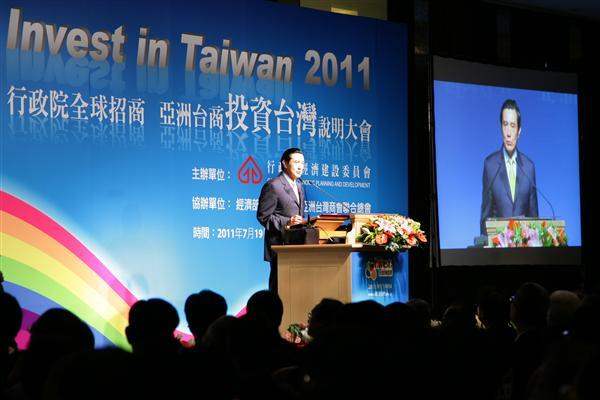News & activities
 News releases
News releases
President Ma Ying-jeou on the morning of July 19 attended Invest in Taiwan 2011, an event organized to attract Taiwan companies operating elsewhere in Asia to invest here in Taiwan. The president explained the wide variety of measures that the government has introduced to spark investment, and urged Taiwanese companies to invest here and help promote Taiwan's economic development.
The president remarked that four years ago when he was campaigning for the presidency, many Taiwan companies operating overseas, and especially those in mainland China, looked to list their shares in Hong Kong after turning profitable. At one point 67 such companies were listed there. Consequently, he felt keenly that he would absolutely have to find ways to attract these Taiwan companies back here after assuming the presidency. This was one of his reasons for formulating the i-Taiwan 12 Projects initiative. Over the past three years, the amount of capital invested by Taiwanese firms overseas has risen annually and totaled NT$97.5 billion over the three-year period from 2008 to 2010. The president noted that another 32 investments amounting to NT$25.3 billion were seen in the first half of this year, and statistics from the Ministry of Economic Affairs indicate that 27 foreign companies have signed Letters of Intent with the ROC to invest some NT$108.3 billion in Taiwan.
President Ma remarked that investment and exports will drive Taiwan's future economic development. He explained, however, that while last year's imports were smaller than exports, the growth rate for imports exceeded that of exports, driven mainly by machinery and equipment. In addition, domestic investment in 2010 rose 32.5% from the previous year, marking the highest growth in 45 years, he said. In other words, Taiwan's economic growth relies not only on exports, but also on domestic investment.
President Ma furthermore explained that investment growth has created 380,000 jobs in recent years and helped reduce Taiwan's unemployment rate from a high of 6.13% in August 2009 to 4.27% in May of this year. The president stressed that "this figure is by no means fudged, and in fact points to very real changes in the overall employment environment." He said that many in the business community have indicated that labor shortages are now a bigger problem than unemployment, which is due to shortcomings in systems for matching workers to appropriate jobs. President Ma said the Council of Labor Affairs is presently implementing a host of measures designed to help enterprises find appropriate labor.
The president added that in July of last year he instructed the Council for Economic Planning and Development to strengthen efforts to recruit investment from throughout the world. Over the past year, the Executive Yuan's Global Investment Promotion Task Force has held five investment seminars in Taiwan, along with likeminded seminars in Japan, India, the United States, and Singapore. These events have been well-received, he said, adding that today's event focuses on attracting Taiwan companies operating throughout Asia to come back to invest in Taiwan.
President Ma spoke about various measures adopted by the government to improve the investment climate, such as reducing the business income tax rate to 17% from 25%, and the estate tax rate to 10% from 50%. In addition, other liberalization and deregulation steps have been implemented with the understanding that openness brings prosperity, while shutting oneself off is detrimental. The president stated that Taiwan investments in mainland China have not shown significant growth since the government relaxed rules allowing companies to invest 60% of their net worth in mainland China (up from the previous limit of 40%), but Taiwan-bound investments by Taiwan firms operating in the mainland have increased. President Ma stressed that we cannot put our economy in a birdcage, so the government will work to implement liberalization measures with the objective of attracting greater numbers of overseas-based Taiwan companies to invest in Taiwan.



